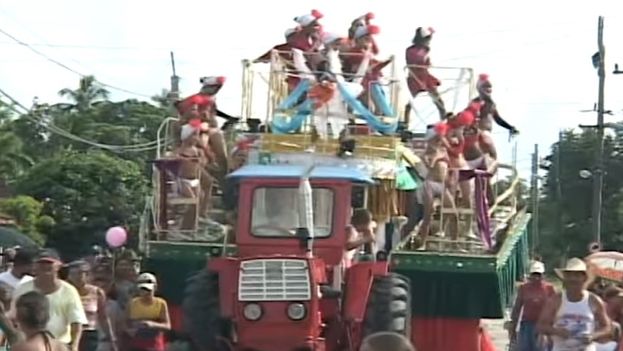
![]() 14ymedio, 29 August 2016 — A few days ago I arrived in the town of Cespedes, where my house is, and among the things that caught my attention was a sign in one of the town’s snack bars with the following announcement: “All food will increase in price 0.10 centavos for special account concept.”
14ymedio, 29 August 2016 — A few days ago I arrived in the town of Cespedes, where my house is, and among the things that caught my attention was a sign in one of the town’s snack bars with the following announcement: “All food will increase in price 0.10 centavos for special account concept.”
A logical question immediately came to mind: What is a special account and what is it used for? Given my concern, and using my civil right, as expressed in Article 63 of the Constitution of the Republic – “Every citizen has the right to direct complaints and petitions to the authorities and to receive the pertinent attention or answers in a reasonable time, according to the law” – I began to investigate in the appropriate places.
On 25 August, in the same snack bar I asked the clerk, Hortelio, who told me the sign had been posted but he didn’t know anything about it, he didn’t even know what a special account was. As I was on my way, I went to the Municipal Commerce Enterprise, but there I only found Betsy, in charge of the defense and command post. This official explained to me that she wasn’t sure, but the increase was because of the carnivals and the special account was the Ministry of Culture. She recommended that I come back another day and ask to speak to the director.
Continuing on my way, I came to another snack bar, where Ariel spoke with me, and showed me a resolution from the Municipal Administrative Council authorizing the 0.10 centavo charge as a tax on food products, 0.20 centavos on beer or rum, and that this would be during popular fiestas. My original questions remained unanswered.
The next day, 26 August, I went to the Municipal Commerce Enterprise. The entity’s municipal director saw me, a man with the surname Perez-Ibanez, and he explained to me that the special account was the tax on products sold during popular fiestas (carnivals) and that it was collected in order to pay the musical orchestras who were contracted by the municipality for these festivities, as well as other expenses related to the celebrations.
In Cespedes the carnivals began on 22 July [ed. note: “carnival” in Cuba is a “flexible” holiday that occurs at different times in different years in different places, seemingly according to the whims of the higher ups], and it was already more than a month later and the tax was still being applied. The municipal director’s response to this complaint was that during the three days of the carnival it was impossible to sell everything that was in the plan. He added, that the Municipal Administrative Council was considering the vacation period as popular fiestas and for these reasons the charge continued.
I asked if the Council had not approved a budget for these popular fiestas and he responded in the negative. I found it difficult to understand that a great quantity of people had to pay for the musicians they hadn’t listened to. Not to mention that the quality of the celebrations was terrible, according to the residents, who even said so on Facebook.
Before I left, the director asked me if I had come in a personal capacity or on behalf of some organization. I responded that I came as a citizen and that I did indeed come on behalf of an organization: the people. Despite feeling dissatisfied with the usefulness of the special account, I went home and did nothing more about it.
On 27 August, at 1:45 pm, an official from State Security calling himself Manuel arrived at my house and told me that at 2:00 pm I must present myself at the police station. On going to the place indicated, I was received, in an arrogant and overbearing tone, by the official René. Also there was the director of the Commerce enterprise. It wasn’t by chance. They had cited me to deliver to me a warning letter for counter-revolutionary public demonstrations in divulging state information. According to what they told me, if I did this again I would be accused of espionage.
In response to my claim that I was exercising my citizen’s right in asking a question in an official way for my own understanding, and in addition that it was not about a state secret but about public information, the official René told me that I was lying, because I had published it on the networks. In addition, he explained that any citizen could ask a question but that I could not, because I was a mercenary in the service of imperialism and an opportunist.
They asked me to sign the warning letter which I refused to do, and in addition they “warned” me to get out of Cespedes, that here I would not “have a career.” They also told me that if I stayed it was all the same to them because they had won a lot of awards and would continue to win awards if they managed to control me here.
Many questions could emerge from this, one more of the many meetings I have had with State Security, but I wonder: By what law or what authority, for the fact of being opponents or dissidents, can they limit our civil rights? How can a simple question constitute a crime against State Security? How much longer is the most basic freedom of expression going to be a crime in Cuba? Apparently, in the municipality of Cespedes, in Camagüey, which by all indications is governed by a special law, asking questions is a crime.
